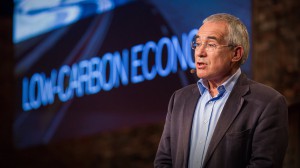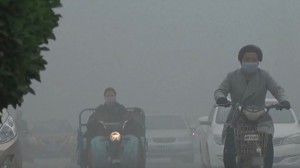
Lord Nicholas Stern, who wrote a report on the negative impact climate change has on the economy, says he's more concerned than ever.
The ultimate impact of climate change to the global economy has increased during the last decade, but technological advances in sectors such as the auto industry offer some hope for the future.
Lord Nicolas Stern told a conference on “Coping with Change: Global Warming and Decarbonization” sponsored by Venice International University and Alcantara, a supplier of high-tech fabric used in luxury automobiles that time to address the impact of climate change is growing short.
“I am more worried than I was a decade ago,” said Stern, a professor of economics and government and chair of the Grantham Institute on Climate Change and the Environment at the London School of Economics.
He produced a landmark report 10 years ago on potential economic damage from the continued release of carbon dioxide into the environment while head the United Kingdom’s Economic Service.
(CAR Study: Autonomous revolution coming slower than expected. Click Herefor the story.)

Ford Executive Chairman Bill Ford, a known environmentalist, said the company is "all in" on electric vehicles.
“If anything, the risks are even bigger,” said Stern as ice continues to disappear from the Arctic and weather events across become more extreme. On the positive side, however, the technology is changing more quickly.
“Every major car company is moving to make electric and hybrid vehicles,” noted Stern, who noted recent announcements by the Ford Motor Co. as evidence of the shift.
Ford in January said it planned to build 40 electrified vehicles Ford plans for its global lineup by 2022. Sixteen of the new vehicles will be fully electric and the rest will be plug-in hybrids, executives said.
“We’re all in on this and we’re taking our mainstream vehicles, our most iconic vehicles, and we’re electrifying them,” Chairman William Ford Jr. told reporters after the announcement during the North American International Auto Show in Detroit in January.
“If we want to be successful with electrification, we have to do it with vehicles that are already popular,” Ford said.
Stern added there are other signs of change across the transport sector. “Major cities such as London and Paris are moving to ban internal combustion engines from their centers,” Stern said.
China, India, France and the UK have all announced plans to phase out vehicles powered by combustion engines and fossil fuels between 2030 and 2040.
“Another dramatic change is fall in the cost of renewables,” he said. “The technology has moved.”
(Click Here to see why auto council is calling for more hydrogen technology.)
The politics behind preparing to face climate change remains “variable” in the age of Trump and Brexit. But China and India have stepped forward to address the issue. In fact, one of the positive developments with the shift away from viewing climate change as inevitable, and the move toward the “bottom up” approach incorporated into the Paris Agreement on Climate Change in 2015, which asks each of the 161 signatories to set their own objectives and strategies.
The original “Stern Review,” which was published under the auspices, was described as alarmist by critics but it provoked widespread debate and the public awareness of the threat posed by climate change.
“No one can predict the consequences of climate change with complete certainty; but we now know enough to understand the risks. Mitigation – taking strong action to reduce emissions – must be viewed as an investment, a cost incurred now and in the coming few decades to avoid the risks of very severe consequences in the future,” the Stern Review noted.
“If these investments are made wisely, the costs will be manageable, and there will be a wide range of opportunities for growth and development along the way,” it added.
Stern said this week the challenges remain daunting. The world will be required, by population growth, the size of global economy is likely to double in the next 20 years and the urban population around the world in the next 35 years.
(To see why Toyota, BMW get high marks for environmental practices, Click Here.)
The planning for more compact, energy efficient cities that use autonomous vehicles and other kinds of smart technology has to start now, Stern said. The infrastructure needed to support the growing population will to double in scope. If the world simply replicates what exists now, the resulting carbon dioxide emissions would lead to irreversible damage to the environment.

